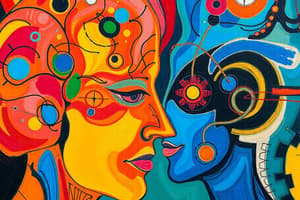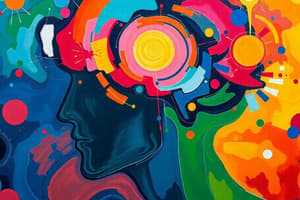Podcast
Questions and Answers
Which perspective views the mind and body as two distinct types of things that can interact with each other?
Which perspective views the mind and body as two distinct types of things that can interact with each other?
- Dualism (correct)
- Idealism
- Monism
- Materialism
Who proposed the dualistic view that the mind (Res Cogitans) and the body (Res Extensa) are two separate substances?
Who proposed the dualistic view that the mind (Res Cogitans) and the body (Res Extensa) are two separate substances?
- Plato
- Locke
- Descartes (correct)
- Aristotle
Which theory posits that there is only one fundamental type of thing, often referred to as 'stuff', 'substance', or 'energy'?
Which theory posits that there is only one fundamental type of thing, often referred to as 'stuff', 'substance', or 'energy'?
- Pluralism
- Monism (correct)
- Nihilism
- Solipsism
One of the challenges faced by dualism is:
One of the challenges faced by dualism is:
Which concept refers to the qualitative aspects of our conscious experiences, such as the taste of coffee or the color red?
Which concept refers to the qualitative aspects of our conscious experiences, such as the taste of coffee or the color red?
What does qualia refer to?
What does qualia refer to?
Which philosophical perspective argues that consciousness emerges from lower-level interactions?
Which philosophical perspective argues that consciousness emerges from lower-level interactions?
In the context of the mind-body problem, what is the main concern regarding dualism?
In the context of the mind-body problem, what is the main concern regarding dualism?
Which approach argues that the universe consists solely of matter and can explain all phenomena, including mental states?
Which approach argues that the universe consists solely of matter and can explain all phenomena, including mental states?
Why do qualia often pose a challenge to monist positions?
Why do qualia often pose a challenge to monist positions?
Study Notes
Consciousness and Mind-Body Relationship: Exploring Dualism, Monism, Qualia, and the Mind-Body Problem
What does it mean to be conscious? How does our sense of self interact with our physical body? These questions have been at the center of philosophical debates since antiquity, as we try to understand the nature of human experience and the connection between our minds and bodies. In this exploration, we will delve into the concepts of dualism, monism, qualia, and the mind-body problem, which are key aspects of how consciousness relates to the material world.
A Brief Introduction to Dualism
Dualism is the view that the mind and the body are two distinct types of things that can interact with each other, yet they remain fundamentally different from one another. This perspective has its roots in Plato's theory of forms, where the soul is considered separate from the body and more real than the material world. Descartes famously proposed this position by theorizing that the thinking substance of the mind (Res Cogitans) was something entirely different from the corporeal stuff of the body (Res Extensa). However, dualism also faces challenges. For instance, if the mind and body are truly independent substances, it's unclear how they could influence each other.
Monism: A Single Substance View
Monism, on the other hand, posits that there is only one fundamental type of thing, often referred to as 'stuff', 'substance', or 'energy'. This view sees the mind and body as two ways of describing the same underlying reality; thus, they are not separate entities. Advocates of this approach argue that the materialistic conception of reality—which says the universe consists solely of matter—can explain all phenomena, including mental states.
Consciousness and Qualia
Qualia refers to the subjective aspect of our experiences—the 'what it's like' to perceive something. They are the raw data that make up our perception and awareness. Qualia are often used to challenge monist positions because they seem to defy physical explanation. How can the firing of neurons explain the redness of an apple or the sound of a symphony? This question leads us to the mind-body problem.
The Mind-Body Problem
The mind-body problem asks how the mind and body relate to each other. If they are two distinct things, as dualism suggests, how do they interact? And if they are one thing, as monism proposes, how do we account for the apparent differences between them? One common answer is a form of dual interactionism, which posits that both the mind and the brain exist independently and can causally affect each other. Another response is emergentism, which argues that higher-level properties like those associated with consciousness emerge from lower-level interactions.
Perspectives Across Disciplines
These perspectives are not just confined to philosophy. In neuroscience, researchers study the brain's activity and attempt to correlate it with consciousness. However, many feel that current knowledge falls short of explaining exactly what consciousness is and how it connects with the brain. In psychology, theories abound about how the mind works, although most would agree that it involves complex processes involving neural networks and cognitive functions.
In conclusion, understanding consciousness and the mind-body relationship remains a challenging task for philosophers, scientists, and anyone interested in the nature of human existence. While progress has been made, we continue to grapple with these profound questions, exploring various perspectives such as dualism, monism, qualia, and the mind-body problem. As we gain new insights through interdisciplinary endeavors, our views may evolve, but the core issues surrounding the link between consciousness and our physical selves likely won't disappear anytime soon.
Studying That Suits You
Use AI to generate personalized quizzes and flashcards to suit your learning preferences.
Description
Explore the concepts of dualism, monism, qualia, and the mind-body problem in this quiz that delves into the philosophical debates surrounding consciousness and the connection between the mind and body. From Descartes' dualism to modern perspectives on qualia and emergentism, this quiz offers an insightful journey into understanding human experiences and the complexities of consciousness.




